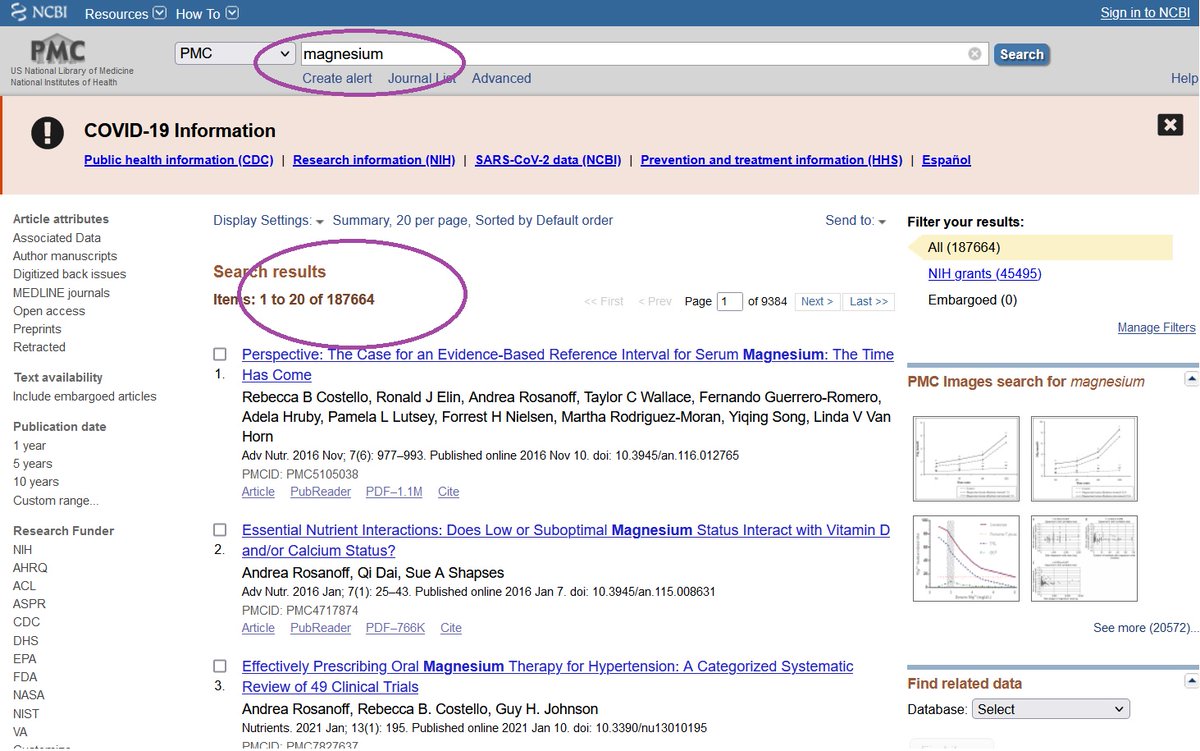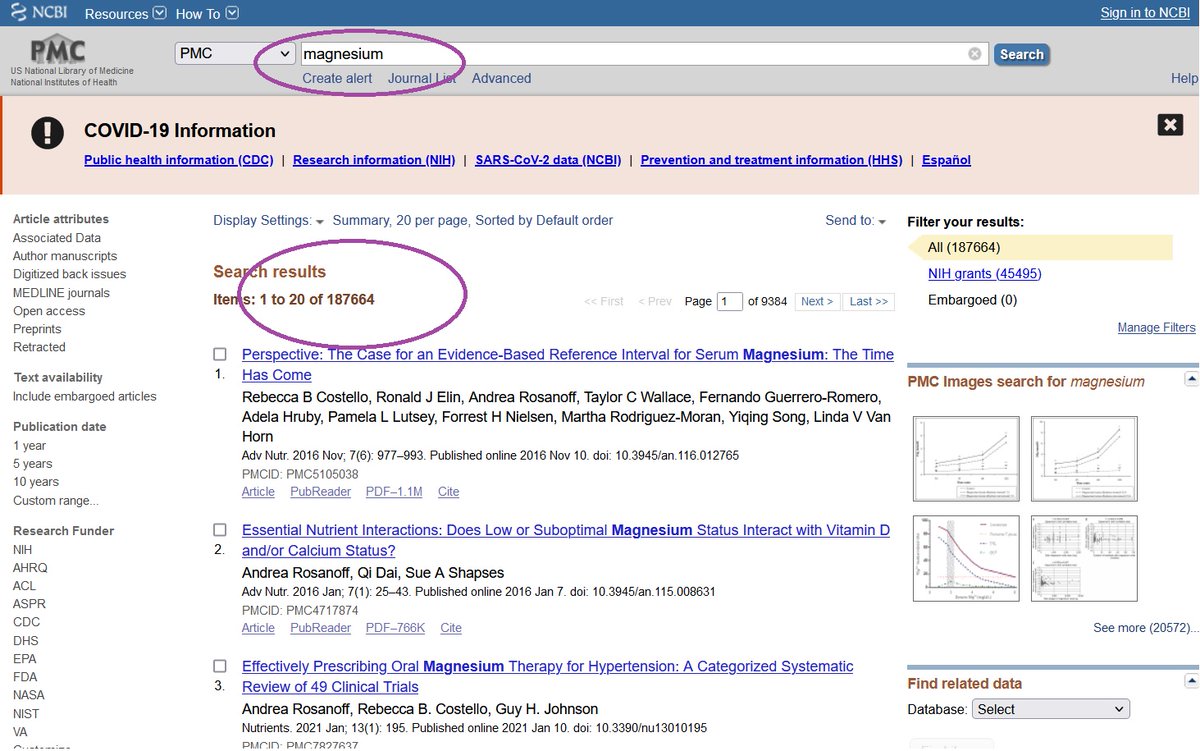
x Magnesium girl....
which magnesium, which brand & how much?
The🧵to which I will refer anyone who asks these questions!
Unlike most supplements magnesium is unstable by itself so always 'hangs out with a mate' - hehe.
This mate is called a chelate (pronounced: key-layt).
which magnesium, which brand & how much?
The🧵to which I will refer anyone who asks these questions!
Unlike most supplements magnesium is unstable by itself so always 'hangs out with a mate' - hehe.
This mate is called a chelate (pronounced: key-layt).
Some 'forms' or 'compounds' of magnesium are naturally found in nature...
Form - Magnesium percentage - name/AKA:
Oxide - 60.30% - periclase
Hydroxide - 41.68% - brucite
Carbonate - 28.83% - magnesite/chalk
Chloride - 25.53% - magnesium flakes
Sulfate - 20.19% - Epsom salt
Form - Magnesium percentage - name/AKA:
Oxide - 60.30% - periclase
Hydroxide - 41.68% - brucite
Carbonate - 28.83% - magnesite/chalk
Chloride - 25.53% - magnesium flakes
Sulfate - 20.19% - Epsom salt

It is possible to supplement the above orally
- ie. swallowing.
But Epsom salts & magnesium flakes are most commonly used topically via bathing.
Enjoying a bath or footbath with either (or both) allows the magnesium to enter your bloodstream through hair follicles & nails.
- ie. swallowing.
But Epsom salts & magnesium flakes are most commonly used topically via bathing.
Enjoying a bath or footbath with either (or both) allows the magnesium to enter your bloodstream through hair follicles & nails.

Epsom salts (ie magnesium with sulfur)
Magnesium flakes (ie magnesium with chlorine)
are used topically as a spray too.
Make up a solution with clean water in spray bottle @ max 20% salt. Glass bottle is best.
Consider if you want sulfur or chlorine. Note flakes have higher Mg.
Magnesium flakes (ie magnesium with chlorine)
are used topically as a spray too.
Make up a solution with clean water in spray bottle @ max 20% salt. Glass bottle is best.
Consider if you want sulfur or chlorine. Note flakes have higher Mg.

When having a panic attack, migraine, cramp or other urgent need to increase magnesium quickly spray this on hairy parts or directly onto your nails to get it in to you system quick.
Some folks also nebulise/inhale these to help with health issues eg asthma at weaker solution.
Some folks also nebulise/inhale these to help with health issues eg asthma at weaker solution.
There are many manmade forms of magnesium.
I'm hoping this list is best for updating on this: en.wikipedia.org/wiki/Category:…
They most commonly come as a 'capsule' format where powder is inside a capsule to be swallowed.
Powders are also available (but usually taste gross IMO).
I'm hoping this list is best for updating on this: en.wikipedia.org/wiki/Category:…
They most commonly come as a 'capsule' format where powder is inside a capsule to be swallowed.
Powders are also available (but usually taste gross IMO).

For long term oral (swallowing/ingested) supplementation I recommend...
😍 Magnesium glycinate 😍
AKA magnesium bisglycinate; magnesium diglycinate.
This is not natural form.
For 1 molecule of magnesium there are 2 molecules of glycine.
It is 14.1% magnesium in mass.
😍 Magnesium glycinate 😍
AKA magnesium bisglycinate; magnesium diglycinate.
This is not natural form.
For 1 molecule of magnesium there are 2 molecules of glycine.
It is 14.1% magnesium in mass.

Glycine is an amino acid (protein).
It is most abundant in bone broth (recommended) but comes from non-animal sources too.
Glycine is essential for collagen repair. Collagen is the second largest substance found in body after water.
Most sports injuries are collagen damage.
It is most abundant in bone broth (recommended) but comes from non-animal sources too.
Glycine is essential for collagen repair. Collagen is the second largest substance found in body after water.
Most sports injuries are collagen damage.

Usually we talk about collagen linked to skin but this is only as it is easy to see the affect of healing collagen there.
Collagen is in barriers, bone, muscle, soft tissues & connective tissues right throughout the body.
Collagen provides flexibility, structure & protection.
Collagen is in barriers, bone, muscle, soft tissues & connective tissues right throughout the body.
Collagen provides flexibility, structure & protection.

Healing collagen means you heal your gut (intestine) walls.
And magnesium and glycine are two major nutrients to help do this.
If your gut does not work well cos the walls have become damaged or inflammed your health becomes compromised.
Gut health is the fundamental health.
And magnesium and glycine are two major nutrients to help do this.
If your gut does not work well cos the walls have become damaged or inflammed your health becomes compromised.
Gut health is the fundamental health.

Healing collagen is a little fickle unfortunately.
You need to ensure you have plenty of these available:
Amino acids: glycine, proline, lysine
Minerals: magnesium, zinc, sulfur, silicon & other trace minerals (copper, manganese etc)
Others: Vitamin C, hyaluronic acid
You need to ensure you have plenty of these available:
Amino acids: glycine, proline, lysine
Minerals: magnesium, zinc, sulfur, silicon & other trace minerals (copper, manganese etc)
Others: Vitamin C, hyaluronic acid
Along with magnesium glycinate I drink bone broth daily with a pinch of sea salt* & vitamin C foods. I add garlic or onion powder for sulfur & herbs to taste.
I use a powder usually but here's a recipe:
*Sea salt from close to where you were born is best
I use a powder usually but here's a recipe:
https://twitter.com/coookwithchris/status/1435377631667658752
*Sea salt from close to where you were born is best
Aloe Vera speeds up healing collagen. Take capsules or a decent juice drink NOT powder as it tastes rank.
Bone broth is the easiest way to heal collagen as it has so many of the components needed already but the glycine in magnesium glycinate is a huge bonus for other reasons.
Bone broth is the easiest way to heal collagen as it has so many of the components needed already but the glycine in magnesium glycinate is a huge bonus for other reasons.

For a detailed thread with a whole load of other reasons why glycine is where it's at in the magnesium world please read this great thread:
Please note some cheeky language is used & his market is younger males who hit the gym so my dosing is more modest.
https://twitter.com/realalejandroAD/status/1419491698456080384
Please note some cheeky language is used & his market is younger males who hit the gym so my dosing is more modest.
Collagen healing & production is also affected by melatonin production and sleep quality.
Magnesium supplementation usually helps improve people's sleep.
Doses should be split between
daylight (day) and dim light (night)
to ensure serotonin v melatonin production boosts.
Magnesium supplementation usually helps improve people's sleep.
Doses should be split between
daylight (day) and dim light (night)
to ensure serotonin v melatonin production boosts.

Increase your dose slowly when starting to take magnesium as it will be a shock to your body to have an abundance available.
Any surplus your body is unable to use that day gets excreted in urine and stool.
Magnesium draws water into the intestines which can cause loose stool.
Any surplus your body is unable to use that day gets excreted in urine and stool.
Magnesium draws water into the intestines which can cause loose stool.

UK NHS recommended amounts for magnesium are:
270mg a day for women
300mg a day for men
nhs.uk/conditions/vit…
Linus Pauling recommendations are:
300-320mg a day for women
400- 420mg a day for men
lpi.oregonstate.edu/mic/minerals/m…
This is the elemental magnesium part from all sources.
270mg a day for women
300mg a day for men
nhs.uk/conditions/vit…
Linus Pauling recommendations are:
300-320mg a day for women
400- 420mg a day for men
lpi.oregonstate.edu/mic/minerals/m…
This is the elemental magnesium part from all sources.
I think that the way that these amounts were determined decades ago may not have been the best way of gauging the levels of magnesium need in the body for optimum health.
They used a masculine yang mentality and methodology. Magnesium seems connected to a feminine yin way IMO.
They used a masculine yang mentality and methodology. Magnesium seems connected to a feminine yin way IMO.

The NHS daily requirements of the other major electrolytes are:
⚖️potassium 3,500mg
⚖️sodium 2,400mg
⚖️calcium 700mg
So the magnesium intake at less than half of the smallest of these seems too small in comparison.
But, magnesium is used in every cell & recycled in the body.
⚖️potassium 3,500mg
⚖️sodium 2,400mg
⚖️calcium 700mg
So the magnesium intake at less than half of the smallest of these seems too small in comparison.
But, magnesium is used in every cell & recycled in the body.
Dietary intake of magnesium is lower these days due to poorer soil quality meaning less in the food chain.
Bitter and green foods & drink are not consumed as much yet we have a very heavy calcium diet.
Stress, food, physical activity & ill health increase demand for magnesium.
Bitter and green foods & drink are not consumed as much yet we have a very heavy calcium diet.
Stress, food, physical activity & ill health increase demand for magnesium.

You will need to work out by listening to your body what is the right amount of magnesium for you.
Magnesium supplements can interact with some antibiotic types & medicines so definitely consult your medical practitioner.
If you go too fast/high you poop/have digestive issues.
Magnesium supplements can interact with some antibiotic types & medicines so definitely consult your medical practitioner.
If you go too fast/high you poop/have digestive issues.

I am aware of people using 80-100mg of elemental magnesium per 10kg (22lbs) of weight per day across different types of magnesium & times.
So this is the magnesium only part of their oral supplement.
But this may be too high for you (or not high enough) so listen to your body.
So this is the magnesium only part of their oral supplement.
But this may be too high for you (or not high enough) so listen to your body.
Assuming magnesium glycinate mix is
14.1% magnesium
85.9% glycine
Dose per 10kg/22lbs of weight/day:
Mg: 80-100mg
Glycine: 490-610mg
Total dosage: 570 - 710mg per 10kg/22lbs per day
But you work up to this over months.
14.1% magnesium
85.9% glycine
Dose per 10kg/22lbs of weight/day:
Mg: 80-100mg
Glycine: 490-610mg
Total dosage: 570 - 710mg per 10kg/22lbs per day
But you work up to this over months.
Some people do not get on well with magnesium glycinate.
Varying the form of magnesium may be better for you.
Some people need to increase their boron intake to process the magnesium.
I do not recommend any brands as have no way of verifying quality but @Labdoor may help you.
Varying the form of magnesium may be better for you.
Some people need to increase their boron intake to process the magnesium.
I do not recommend any brands as have no way of verifying quality but @Labdoor may help you.
Frustratingly, your body organ magnesium level is not reflected in a blood test (even though medical professionals often use blood tests to try to determine this).
Less than 0.8% of total body magnesium is held in the blood and it is tightly regulated!
mdpi.com/2072-6643/10/9…
Less than 0.8% of total body magnesium is held in the blood and it is tightly regulated!
mdpi.com/2072-6643/10/9…
• • •
Missing some Tweet in this thread? You can try to
force a refresh









